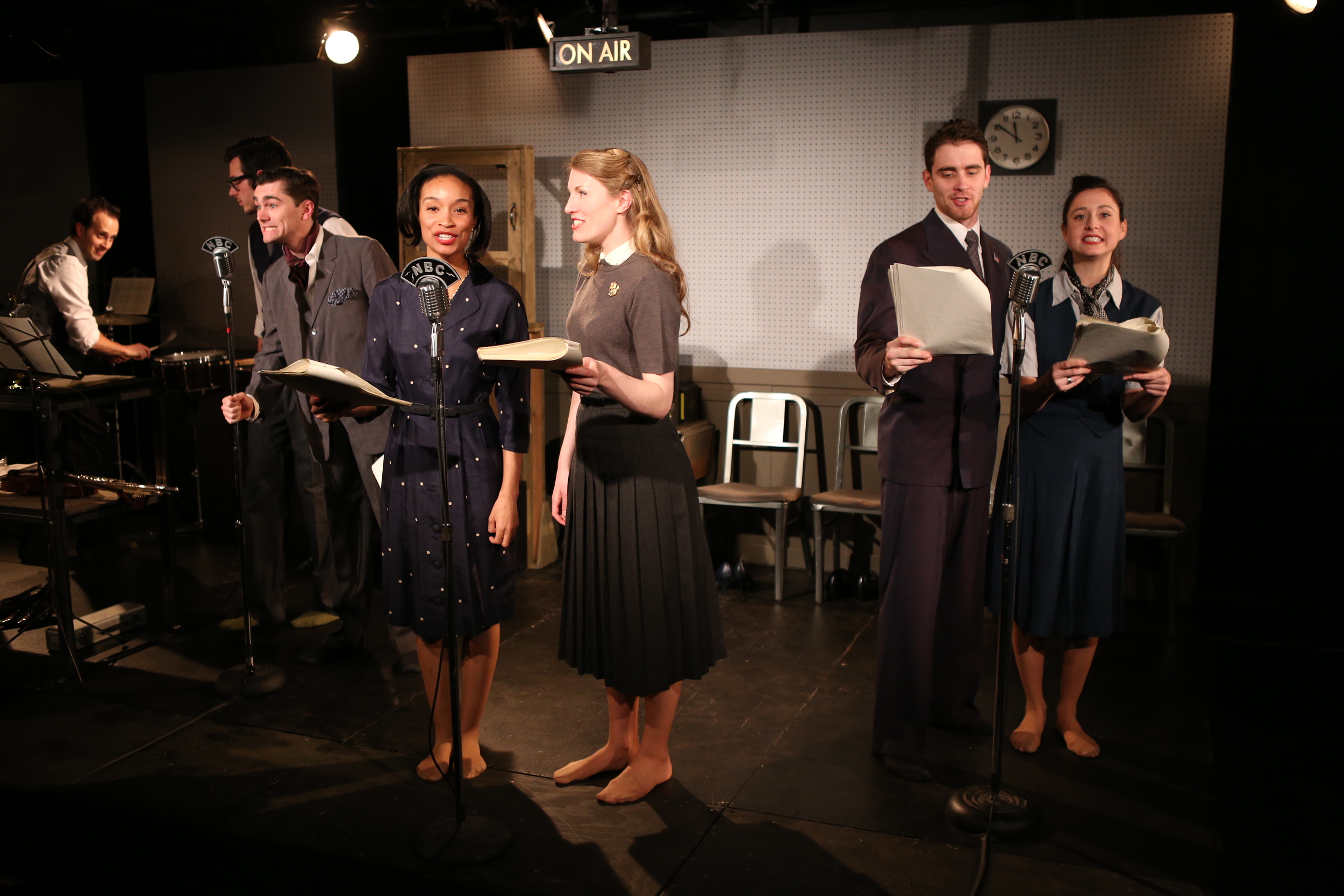Radio Hour, the latest Yale Cabaret offering, was a good choice for Halloween weekend, featuring “Zero Hour,” an eerie sci-fi tale by Ray Bradbury, adapted for radio, and an episode of John Meston’s Gunsmoke. The show, a live “broadcast” in the style of late fifties radio, offers not only the entertainment of experiencing the variety of voices an actor is capable of, but also the opportunity to see the making of all the special sound effects, called Foley.

Conceived by Tyler Kieffer—who gets to do the unmistakeable voice of Sheriff Matt Dillon’s sidekick, Chester, in Gunsmoke—and Steve Brush, who, like Kieffer, performs some of the many sound effects, and directed by Paula Bennett, the show is a straight-forward homage to an era of entertainment that predates most of us in the audience. The best thing about the show is its grasp of the showbiz conventions that made radio programs so indelible for their listeners, and its wonderful evocation, via Hunter Kaczorowski's costumes and the props of Reid Thompson's scenic design, of radio as it was two generations ago.
And yet it's no disservice to say that, while it’s hard not to look at actors and Foley artists performing before one, the entire show might be best enjoyed with one’s eyes closed, letting it all take place in one’s mind, as it did for listeners in the time of classic radio. The show includes genuine commercial breaks, a part of the whole that becomes one of the more entertaining aspects of Radio Hour as nothing says nostalgia like the ads of yesteryear. (I saw the show late Saturday night with my daughter and we were greatly amused to see and hear a rendition of the Choo-Choo Charlie commercial for Good’n’Plenty that, in an animated version on TV, was a part of my childhood that I verbalized for her childhood.)
Anyone watching Radio Hour is bound to have his or her favorite voice moment—Prema Cruz’s laconic Shilo is a voice that immediately creates an image, and her little kid voice is entertainingly vivid, as is Ariana Venturi’s Mink, a bratty kid who turns against her parents in favor of a mysterious playmate called “Dril”; Brendan Pelsue creates a bizarre over-the-top pastiche of accents for the Announcer that amuses and surprises, while Aaron Luis Profumo performs the toffee-voiced tones of a patient dad, as well as the masculine composure of Sheriff Dillon, matched by the coy affection of Ashton Heyl’s Big Kate. Seconding all the vocal talent—and creating footsteps, slamming doors, fist fights, gunshots, dramatic music and jingles—the one for Mr. Clean is bound to stay in your head—are Foley artist/musicians Kieffer, Brush, Jing (Annie) Yin, and David Perry.
The stories selected are easy to follow, and also somewhat didactic: parents learn the price of their condescension to their children’s imaginations in Zero Hour, and a would-be husband learns that even in the patriarchal Old West taking a woman for granted can lead to humiliation, especially with Matt Dillon around to set things right. The cast played well to the audience’s sense of old-time charm, so that the entire evening was a bit like time travel.
It’s interesting that shows which, whether on radio or TV, would strike us as corny or simplistic, can inspire a respect when played with a sense of history and irony for audiences otherwise too sophisticated for such genre fare. Which leads me to wonder if, with shows like Mad Men trading on the “romance” of advertising, it’s not time for a TV show set on an old-time radio program where the interface between what happens on and off the air is where the comedy or drama lies.
For Radio Hour, the entertainment is in the staging even more than in what is staged.
Radio Hour Featuring Ray Bradbury’s Zero Hour and John Meston’s Gunsmoke Conceived by Tyler Kieffer and Steve Brush Directed by Paula Bennett
Dramaturg: Helen Jaksch; Scenic Designer: Reid Thompson; Costume Designer: Hunter Kaczorowski; Lighting Designer: Joey Moro; Sound Designer: Tyler Kieffer; Sound Designer/Composer: Steve Brush; Stage Manager: Kate Pincus; Technical Director: Rose Bochansky; Producer: Melissa Zimmerman; Photographs by Nick Thigpen
Yale Cabaret October 31-November 2, 2013
This week the Cab is dark, then returns November 14-16, with Sarah Kane’s Crave, directed by Hansol Jung, a play that investigates the psychic costs of the creative act with a quartet of actors enacting voices all alive in a writer’s mind.



